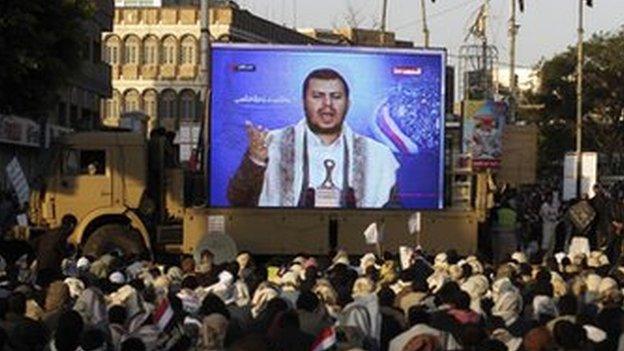How Yemen's capital Sanaa was seized by Houthi rebels
- Published
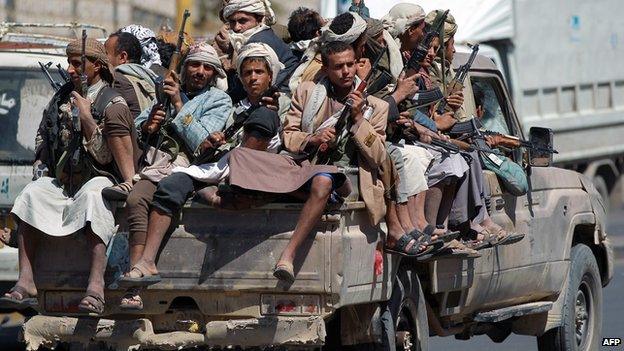
Yemen has remained unstable since anti-government protests in 2011 forced the then-President Ali Abdallah Saleh from office
Shia Houthi rebels in Yemen have signed a deal for a new unity government, little over a month after organising the first armed protest camps in the country's capital, Sanaa. The events have left the city's residents in shock, as Iona Craig reports.
Squeezed into the back of a pick-up truck around an anti-aircraft gun, while parked outside Yemen's parliament, three young men stuff green khat leaves into their mouths.
Chewing the mild, narcotic plant is a daily routine for most Yemenis. The men have curved daggers at their waists and AK-47 rifles resting in the laps of their traditional long, loose robes. The plate on the back of the sand-coloured truck says "al-Jaysh" - the army, but these men are not soldiers.
"Where are you from?" I ask. "Saada," comes the reply.
Saada - a northern Yemeni province, sharing its border with Saudi Arabia - is the stronghold of the Shia Houthi movement, whose militiamen have fought six wars with the government in the province since 2004.
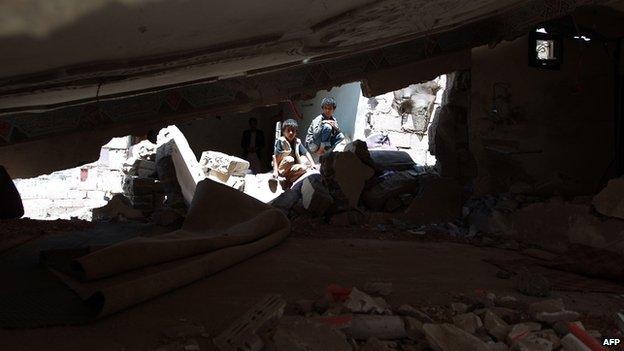
Yemeni children sit amid the debris of their house in Sanaa, after it was damaged during fighting
"What are you doing here?" I ask one of the men, who has a rocket-propelled grenade propped up next to him.
"We are here to protect the building," he says, gesturing towards the parliament with his hand clutching green twigs.
The usual contingent of soldiers tasked with guarding the parliament and nearby cabinet office is nowhere to be seen.
"Where is the army, the soldiers?" I press.
A passing pedestrian who has stopped to listen butts in: "They surrendered. This is the army now." He grins and walks on.
After four days of heavy fighting centred around a major military base in the north-west of Yemen's capital, Sanaa, Houthi gunmen walked up to government institutions across the city and asserted their control without a shot being fired.
The interior minister ordered troops under his control to stand down. Within a couple of hours, the fighters had control of the city. Its residents were in shock.
Confused and curious men spilled out onto the street from their homes where many had been sheltering from the artillery fire and mortar rounds that had earlier rocked the city.
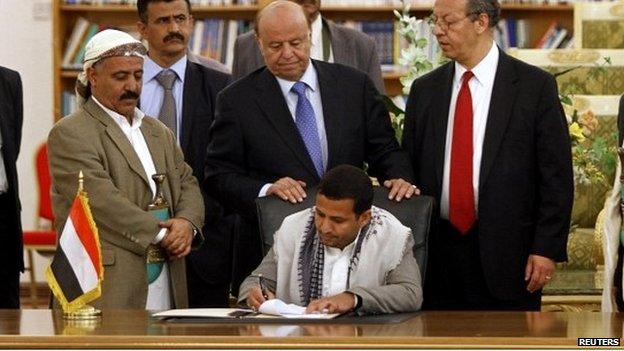
Hussein al-Ezzi, head of political relations for the Houthis, signs an agreement which will see a new government formed
While the militiamen set up checkpoints throughout Sanaa, their political leaders sat down in the presidential palace to sign an agreement to calm the crisis which had been threatening the capital for the last month.
But before the ink was even dry on the deal, the Houthi rebels' victory was complete.
Few had foreseen that the group's push south for territory over the past six months would end in the takeover of the capital Sanaa.
No-one could have imagined the speed with which the rag-tag force of tribesmen would seize the city.
Many suspect Yemen's former President Ali Abdullah Saleh - who was forced to hand over power following the country's 2011 political uprising - had a hand in it.
They believe he facilitated the rebels' advance as they fought tribal militias aligned to the Islah party - Yemen's equivalent to the Muslim Brotherhood and Saleh's arch enemy.
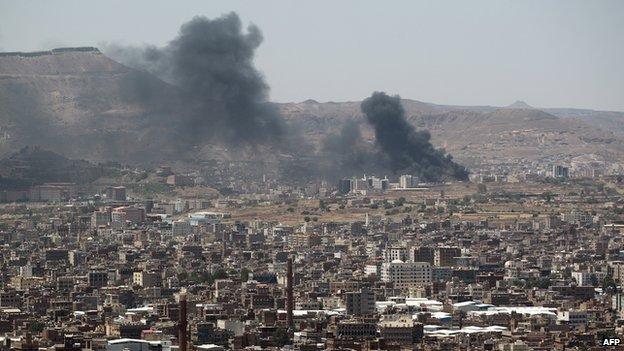
Smoke rises from the main gate of a government military base during an attack by Houthi rebels
In just a few months, the Houthi fighters had managed to do what Saleh could not in 2011 - destroy the tribal power base of Islah and bring down his powerful foe, Major General Ali Mohsen al-Ahmar, who also led wars against the rebels in Saada.
The general - a senior military adviser to President Abdrabbuh Mansour Hadi - is now being hunted down by Houthi fighters.
"We will kill him if we find him," warns one Houthi loyalist, brandishing a vintage bolt-action rifle.
All passengers leaving the airport in Sanaa are now being rigorously checked by the militiamen in search of the general and other opponents who may be attempting to flee the city.
Other political rivals have had their homes raided in apparent attempts to intimidate the rebels' adversaries.
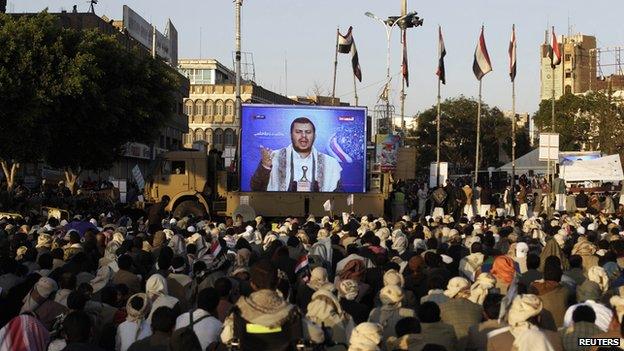
Houthi leader Abdul Malik gives a televised speech after the rebels swept through Sanaa
While the Houthi rebels celebrated a "victorious revolution" in the city's Tahrir Square, the president warned of civil war.
What will happen next is uncertain. According to the terms of the signed deal, a new prime minister will be appointed and a new, more inclusive government will be formed within a month.
Despite Hadi's precarious position, the Houthi fighters have indicated they want a strong hand in a future government without ruling directly.
But there is no sign the gunmen will be leaving the city anytime soon.
In a televised speech by the group's leader, Abdul Malik al-Houthi, to a mass-gathering of his cheering, mostly armed supporters, he pledged his men would join the army to defeat the country's notorious al-Qaeda insurgency and stay until the military is strong enough to maintain security.
Meanwhile, the city's residents are trying to go about their lives as normal.
"In Yemen, the people don't get to decide who has the power," a baker remarks as he places round balls of dough into his stone oven in downtown Sanaa.
"This is a game we can never understand."
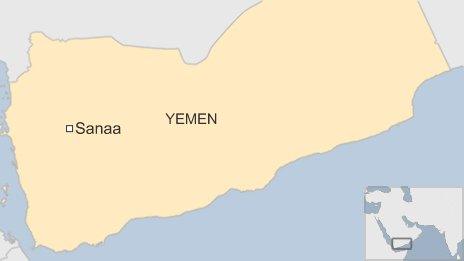
How to listen to From Our Own Correspondent, external:
BBC Radio 4: Saturdays at 11:30
Listen online or download the podcast.
BBC World Service: Short editions Monday-Friday - see World Service programme schedule.
- Published21 September 2014
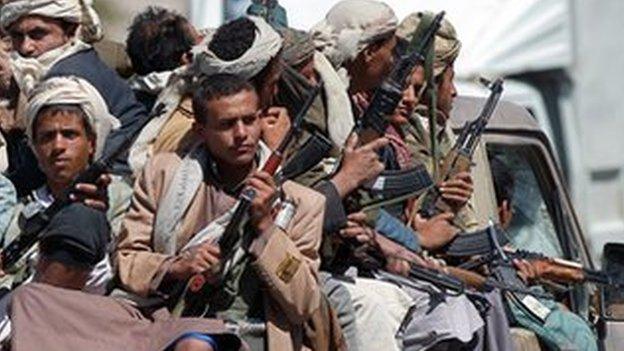
- Published2 September 2014
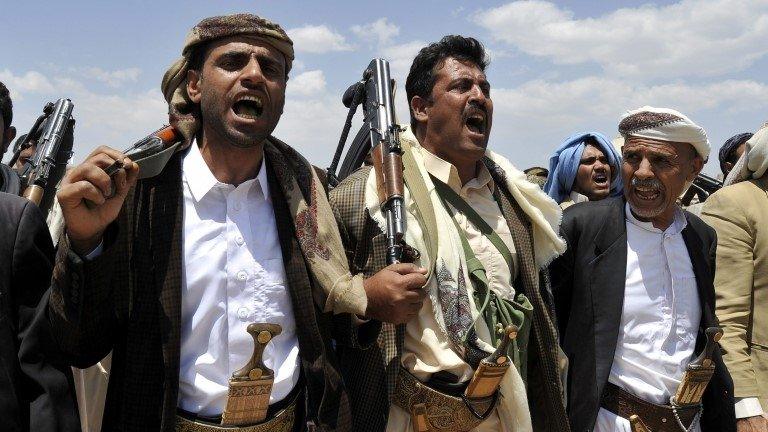
- Published24 September 2014
